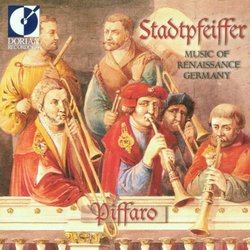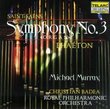| All Artists: Georg Forster, Mack Ramsey, Christa Patton, Piffaro Title: Stadtpfeiffer: Music of Renaissance Germany Members Wishing: 0 Total Copies: 0 Label: Dorian Recordings Release Date: 2/27/2001 Genres: Dance & Electronic, Special Interest, Pop, Classical Styles: Vocal Pop, Opera & Classical Vocal, Chamber Music, Historical Periods, Baroque (c.1600-1750), Classical (c.1770-1830), Early Music Number of Discs: 1 SwapaCD Credits: 1 UPC: 053479029225 |
Search - Georg Forster, Mack Ramsey, Christa Patton :: Stadtpfeiffer: Music of Renaissance Germany
 | Georg Forster, Mack Ramsey, Christa Patton Stadtpfeiffer: Music of Renaissance Germany Genres: Dance & Electronic, Special Interest, Pop, Classical
|
Larger Image |
CD DetailsSimilarly Requested CDs |
CD ReviewsIt made me cry! Paul Frandano | 03/26/2001 (5 out of 5 stars) "I tuned to the classical radio when I ran errands the other day and heard music like none I've heard before. Perfect bagpipes, yet I verified that it was indeed German Rennaisance music. I nearly had to pull over with the tears that came to my eyes!" Lively, intricate and artful music from Piffaro! Brianna Neal | USA | 11/25/2002 (5 out of 5 stars) ""Across early Renaissance Europe," begins commentator Robert Kendrick in the insert introduction, "the best-known wind ensembles consisted largely of players from Germanic lands, who took their craft with them to Italy, Spain, and France." This CD features sophisticated, contrapuntal compositions of Senfl, Isaac, Othmayer and Finck, interspersed with delightfully direct arrangements of simpler tunes by the Piffaro musicians themselves. Alternating consorts of recorders and reeds are enhanced by brass, lute, harp and percussion. Core Piffaro members Adam and Rotem Gilbert, Grant Herreid, Tom Zajac, and co-directors Joan Kimball and Robert Wiemken are joined by guests Benjamin Harris on percussion, Christa Patton on harp, and Mack Ramsey on wind instruments. This is my favorite Piffaro recording so far, because of the variety of distinctive sounds and composition styles. There's a bit of everything on here, and all of it very enjoyable to listen to! Done in a similar vein is the group's 2002 Dorian release, "Music from the Odhecaton: Celebrating the 500th Anniversary of the First Printed Music"." "Kind of Blue," 16th-Century Style Paul Frandano | Reston, Va. USA | 01/06/2007 (5 out of 5 stars) "Most devotees of the great Miles Davis album Kind of Blue know its story from the liner notes by Bill Evans: Miles comes to the studio with a pocketful of modal scales and changes, shows them to the illustrious group - Cannonball Adderley, John Coltrane, Wynton Kelly, Bill Evans, Paul Chambers, and Jimmy Cobb - and everyone simply blows, unrehearsed. The result is the consensus "most influential" or "most beautiful" or simply "the greatest" (and certainly best-selling) jazz album of the '50s and perhaps the entire post-World War II period (and some say "ever"). It popularized "modal jazz," essentially a modal "cantus firmus" ("fixed song") around which players shaped their improvisations.
Lovers of early music - and admirers of "the Renaissance Band" Piffaro - will know exactly where I'm going here. The precision with which early music ensembles like Piffaro perform their repertoire leads most listeners to conclude that every single note is scored as it is played. Nothing could be further from the truth. Generally, such pieces are also built around a modal cantus firmus and consist of ensemble members finding polyphonic, often contrapuntal, lines that harmonize or embellish the main melody. Thanks to Guenther Schuller and other jazz historians, we associate "early jazz" with pioneering, pre-swing era, early 20th century Buddy Bolden/King Oliver/Louis Armstrong/Jelly Roll Morton "spontaneous composition" jazz music. That said, most music lovers know the familiar great players (and often composers) of earlier centuries - Bach, Mozart, Beethoven, Brahms, etc. - were all prodigiously talented spontaneous improvisers. Few of their improvisations have been written down (except as cadenzas to their scored compositions), and we don't connect classical improvisation to jazz music. Nor do we generally connect it to "early music" - that is, music that precedes the Baroque - nor does it seem we should, really: jazz is jazz, and in a distinct way, uniquely American, and Renaissance improvisation is vastly less "free." And now (I know: "at last!") the point: Piffaro's "Stadtpfeiffer: Music of Renaissance Germany" is a glorious tutorial is the Renaissance style of cantus-firmus-plus-improvisation musical composition and performance, as beautiful and surprising in its way as Miles' classic is in its. Each member of this Philadelphia-based ancient-instruments wind ensemble is a technically flawless, multi-instrument musician. And each of the thirty tracks on this generous CD builds from simplicity through several incremental layerings to a thrilling, gyring, soaring, perfectly harmonious multi-voiced conclusion. The scholarship of the group - on display in the attractive, informative notes - is impeccable and results in satisfying arrangements that run through the full diversity of early wind-instrument settings (with occasional percussion, lute, and harp accompaniments). Moreover, as other reviewers have noted, those who think early music wind instrumentation consists solely of the familiar recorders, shawms, crumhorns, serpents, and the like will be stunned by the presence of bagpipes in Piffaro's kitbag. Bagpipes traversed Europe from the Middle East and wound up in the British Isles (and known to most solely via sonic clichés like "Amazing Grace" and "Danny Boy"). Here they're a force of nature, blowing out from a primordial past, pitched higher than Scottish pipes, in swirls of glorious polyphony. If you enjoy Celtic music, or bluegrass, or the Baroque, or the Hot Fives and Sevens, or the Chieftains, or the Lord of the Rings soundtrack, find a copy of this CD and let the ingenuity of Renaissance masters such as Ludwig Senfl and Caspar Othmayr wash over you via the vituoso improvisational playing of Piffaro. "Early jazz" indeed. Stadtpfeiffer (literally, "city piper" or "city musician") is, by the way, still available; you can at least order it from the Piffaro website. I stumbled across mine while Christmas shopping; the attractive cover art caught my eye, I like early music, had some Michael Praetorius but little else from Germany, and so selfishly gave myself a gift, sound unheard. What a find, like pulling down a random book at the library that, once read, has changed your life. I haven't stopped playing it. Neither will you." |

 Track Listings (30) - Disc #1
Track Listings (30) - Disc #1